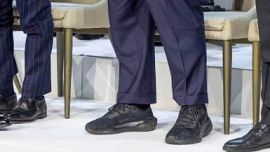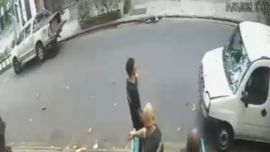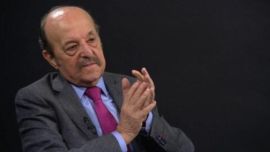Armed men wearing balaclavas burst into the studio of a public television station on Tuesday in Ecuador's drug violence-torn port city of Guayaquil, taking hostage several journalists and staff members, live footage showed.
"Don't shoot, please don't shoot," one women shouted as gunshots rang out while the attackers, carrying rifles and grenades, forced the terrified crew onto the ground.
"National Police units in Quito and Guayaquil have been alerted about this criminal act and are already on the scene," police said in a brief statement.
The live broadcast continued uninterrupted, although lights went off on set.
About 30 minutes after the gunmen appeared, police could be seen entering.
"Police, police," called out one man in uniform. "We have a wounded colleague," a man replied.
"Please, they came in to kill us. God don't let this happen. The criminals are on air," one of the journalists told AFP in a WhatsApp message.
The incident came as Ecuador's new president, 36-year-old Daniel Noboa, grapples with a security nightmare after the escape from prison of one of the country's most high profile gangsters, José Adolfo Macias, known as 'Fito.'
Noboa declared a 60-day countrywide state of emergency Monday, including in Ecuador's notoriously violent prisons, and imposed a night-time curfew.
In response, gangsters took several police officers hostage, and released a chilling video in which one of them was forced to read out a message addressed to Noboa.
"You declared war, you will get war," the clearly terrified officer reads. "You declared a state of emergency. We declare police, civilians and soldiers to be the spoils of war."
Noboa was elected in October on a pledge to fight rampant drug-related crime and violence in the South American country – once considered a bastion of peace, but now a key stop on the US- and Europe-bound cocaine trade.
On Tuesday, the gangs responded.
Authorities reported multiple explosions and said seven police officers had been kidnapped.
They were taken in the coastal city of Machala, in the capital Quito, and in the southwestern province of Los Rios.
A chilling video circulating on social media showed three of the kidnapped officers sitting on the ground with a gun pointed at them as one is forced to read a statement addressed to Noboa.
The statement added that anyone found on the street after 11.00pm (0500 GMT) "will be executed."
The presidency and metro stations in Quito were under military guard on Tuesday.
Police say an explosive device was thrown near a police station in Esmeraldas on the northwest coast and two vehicles were burned in other areas, with no one killed or injured.
In Quito, a car was reportedly blown up, and a device exploded near a pedestrian bridge.
A manhunt is under way for Fito, who had been serving a 34-year sentence for organized crime, drug trafficking and murder when he escaped.
The 44-year-old leader of the powerful Los Choneros gang was declared missing Sunday by police conducting an inspection of a prison in the port city of Guayaquil.
He is believed to have been tipped off and escaped just hours before police arrived.
The Attorney General's office filed charges against two prison officials suspected of aiding his escape.
On Tuesday, officials said another narco boss – Los Lobos leader Fabricio Colón Pico – has also escaped since his arrest last Friday for alleged involvement in a plot to assassinate Ecuador's attorney general.
After the escape of 'Fito' on Sunday, unrest broke out at penitentiaries in six of Ecuador's 24 provinces, according to Ecuador's prison authority SNAI, with guards taken hostage at some of the facilities.
Heavily armed police and soldiers entered the prisons of El Oro, Loja, Chimborazo, Cotopaxi, Azuay and Pichincha, after which the military distributed images of half-naked inmates rounded up in courtyards.
The SNAI has not revealed whether the guards have since been released.
Noboa, who took office in November, said the uprisings were revenge for his actions to "regain control" of the country's prisons.
On Monday, he vowed that: "We will not negotiate with terrorists nor rest until we return peace to all Ecuadoreans."
Last week, Noboa announced the country would construct two maximum security prisons – similar to the one built by Salvadoran President Nayib Bukele in his war against gangs – to hold the most dangerous criminals.
Long a peaceful haven sandwiched between top cocaine exporters Colombia and Peru, Ecuador has seen violence explode in recent years as enemy gangs with links to Mexican and Colombian cartels vie for control.
Drug violence has taken a heavy toll.
The murder rate quadrupled from 2018 to 2022, while last year became the most violent yet with more than 7,800 homicides in the country of about 17 million people and 220 tons of drugs seized, a new record.
Since February 2021, clashes between prisoners have left more than 460 dead, many beheaded or burnt alive.
– TIMES/AFP


























Comments